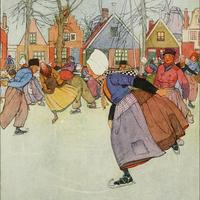Chapter 35. Bones and Tongues
Bones are strange things. One would suppose that they knew nothing at all about school affairs, but they do. Even Jacob Poot's bones, buried as they were in flesh, were sharp in the matter of study hours. Early on the morning of his return they ached through and through, giving Jacob a twinge at every stroke of the school bell, as if to say, "Stop that clapper! There's trouble in it." After school, on the contrary, they were quiet and comfortable; in fact, seemed to be taking a nap among their cushions.
The other boys' bones behaved in a similar manner, but that is not so remarkable. Being nearer the daylight than Jacob's, they might be expected to be more learned in the ways of the world. Master Ludwig's, especially, were like beauty, only skin deep; they were the most knowing bones you ever heard of. Just put before him ever so quietly a grammar book with a long lessons marked in it, and immediately the sly bone over his eyes would set up such an aching! Request him to go to the garret for your foot stove, instantly the bones would remind him that he was "too tired." Ask him to go to the confectioner's, a mile away, and presto! not a bone would remember that it had ever been used before.
Bearing all this in mind, you will not wonder when I tell you that our five boys were among the happiest of the happy throng pouring forth from the schoolhouse that day.
Peter was in excellent spirits. He had heard through Hilda of Dame Brinker's laugh and of Hans's joyous words, and he needed no further proof that Raff Brinker was a cured man. In fact, the news had gone forth in every direction, for miles around. Persons who had never before cared for the Brinkers, or even mentioned them, except with a contemptuous sneer or a shrug of pretended pity, now became singularly familiar with every point of their history. There was no end to the number of ridiculous stories that were flying about.
Hilda, in the excitement of the moment, had stopped to exchange a word with the doctor's coachman as he stood by the horses, pommelling his chest and clapping his hands. Her kind heart was overflowing. She could not help pausing to tell the cold, tired-looking man that she thought the doctor would be out soon; she even hinted to him that she suspected--only suspected--that a wonderful cure had been performed, an idiot brought to his senses. Nay, she was sure of it, for she had heard his widow laugh--no, not his widow, of course, but his wife--for the man was as much alive as anybody, and, for all she knew, sitting up and talking like a lawyer.
All this was very indiscreet. Hilda, in an impenitent sort of way, felt it to be so.
But it is always so delightful to impart pleasant or surprising news!
She went tripping along by the canal, quite resolved to repeat the sin, ad infinitum, and tell nearly every girl and boy in the school.
Meantime Janzoon Kolp came skating by. Of course, in two seconds, he was striking slippery attitudes and shouting saucy things to the coachman, who stared at him in indolent disdain.
This, to Janzoon, was equivalent to an invitation to draw nearer. The coachman was now upon his box, gathering up the reins and grumbling at his horses.
Janzoon accosted him.
"I say. What's going on at the idiot's cottage? Is your boss in there?" Coachman nodded mysteriously.
"Whew!" whistled Janzoon, drawing closer. "Old Brinker dead?" The driver grew big with importance and silent in proportion.
"See here, old pincushion, I'd run home yonder and get you a chunk of gingerbread if I thought you could open your mouth." Old pincushion was human--long hours of waiting had made him ravenously hungry. At Janzoon's hint, his countenance showed signs of a collapse. "That's right, old fellow," pursued his tempter. "Hurry up! What news?--old Brinker dead?" "No, cured! Got his wits," said the coachman, shooting forth his words, one at a time, like so many bullets. Like bullets (figuratively speaking) they hit Janzoon Kolp. He jumped as if he had been shot.
"Goede Gunst! You don't say so!" The man pressed his lips together and looked significantly toward Master Kolp's shabby residence. Just then Janzoon saw a group of boys in the distance. Hailing them in a rowdy style, common to boys of his stamp all over the world, weather in Africa, Japan, Amsterdam, or Paris, he scampered toward them, forgetting coachman, gingerbread, everything but the wonderful news.
Therefore, by sundown it was well known throughout the neighboring country that Dr. Boekman, chancing to stop at the cottage, had given the idiot Brinker a tremendous dose of medicine, as brown as gingerbread. It had taken six men to hold him while it was poured down. The idiot had immediately sprung to his feet, in full possession of all his faculties, knocked over the doctor or thrashed him (there was admitted to be a slight uncertainty as to which of these penalties was inflicted), then sat down and addressed him for all the world like a lawyer. After that he had turned and spoken beautifully to his wife and children. Dame Brinker had laughed herself into violent hysterics. Hans had said, "Here I am, Father, your own dear son!" And Gretel had said, "Here I am, Father, your own dear Gretel!" And the doctor had afterward been seen leaning back in his carriage looking just as white as a corpse.

